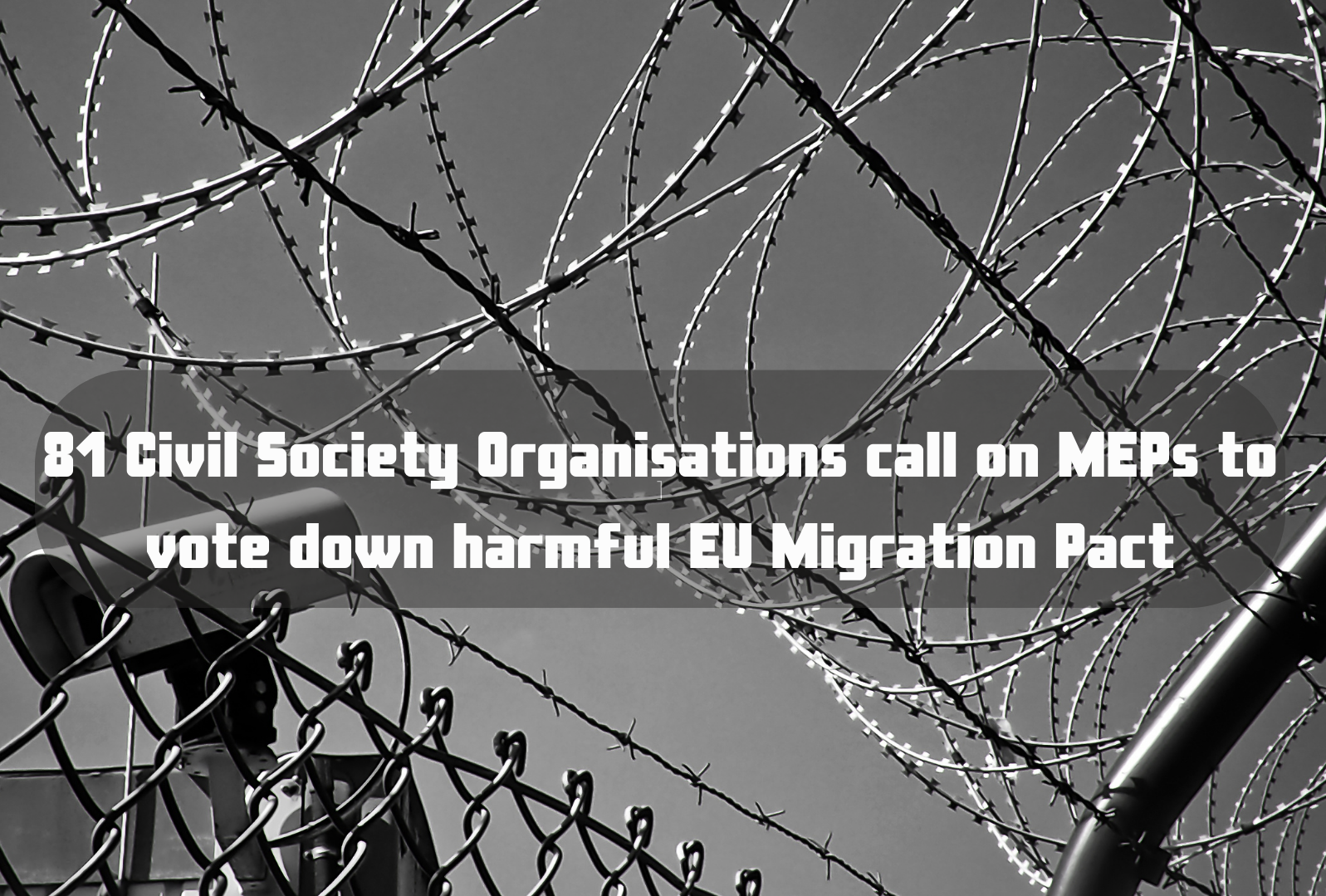
PLEASE SIGN BY 17.00CET ON 08/04/2024 TO BE INCLUDED IN THE FINAL STATEMENT.
If you already signed this statement ahead of the Committee vote in February you do not need to re-sign.
Form to sign: https://forms.gle/esMNkceoiZ9d2sFz8
Amidst warnings from over 50 Civil Society Organisations, EU lawmakers reached a political agreement on the EU’s New Pact on Migration and Asylum in December. The agreement is a continuation of a decade of policy that has led to the proliferation of rights violations in Europe. Moreover, it will have devastating implications for the right to international protection in the bloc and greenlight abuses across Europe including racial profiling, default de facto detention and pushbacks. Tomorrow/Next week, MEPs will be presented with a final chance to reject the files in a Plenary vote, and give a political signal against the adoption of a Pact that would undermine fundamental rights.
Taken together, the Regulations will usher in a new system for ‘managing migration’ in the EU that is characterised by:
- De facto detention at borders with no exemption for families with children of all ages, accelerated, substandard procedures to assess asylum claims rather than full and fair assessments, and an emphasis on return procedures with lowered safeguards.
- Far more asylum applicants will end up in border procedures and, through the ‘legal fiction of non-entry’, will not be considered as on EU territory, which would lead to lower safeguards and heightens the risk of human rights violations and pushbacks at borders. Even unaccompanied children can be held in border procedures when state authorities consider them a ‘danger to national security or public order’. Moreover, experience has shown that containing large numbers of people in border areas for prolonged periods leads to the chronic overcrowding and inhumane conditions, as witnessed on the Aegean islands.
- Through the broadening of the ‘safe third country’ principle, people asking for asylum will be declared inadmissible and increasingly deported to countries outside of the EU on the basis of a widely-defined connection with those countries, heightening the risk of refoulement. In the past, this has manifested in failed agreements like the EU-Turkey deal, externalising the processing of asylum claims to third countries.
- In the absence of safe and regular pathways, people seeking safety or livelihoods are forced to take ever more dangerous routes, resulting in 2023 being the deadliest year on record since 2015. In the Mediterranean alone, more than 2,500 individuals were reported as dead or disappeared last year, a figure that is only the tip of the iceberg. The Pact fails to address this, and instead continues to reinforce Fortress Europe.
- An increase in the use of surveillance technologies at all stages of migration and asylum procedures. The Pact represents a step further into the mass surveillance of migrant and racialised people, as more intrusive technology will be deployed at borders and in detention centres, people’s personal data will be collected in bulk and exchanged between police forces across the EU, or biometric identification systems will be used to track people’s movements and increase policing of undocumented migrants.
Civil society and human rights watchdogs have consistently reported on systematic violations of the fundamental rights of people seeking safety or livelihood, particularly racialised communities by denying them access to shelter, services, and asylum and resorting to pushbacks en masse. All this, whilst pursuing policies that seek to criminalise movement at large, contributes to a shrinking civic space. The Commission put forth the New Pact as a ‘solution’ for uneven standards in the implementation of a Common European Asylum System across Member States. Yet, the Pact does nothing to remedy this nor support Member States receiving large numbers of arrivals at the external borders. The ‘first country of entry’ principle remains and there will be no mandatory relocation of people saved through Search and Rescue missions – an initiative that could have provided humane and sustainable solutions through the proportionate distribution of asylum applicants throughout Europe. Instead, Member States that do not directly receive arrivals can avoid responsibility-sharing by financing border fortification and immigration detention facilities in border Member States or by funding dubious ‘projects’ in non-EU countries.
The negotiations were rushed towards closure by the European Commission and the Spanish and Belgian Presidencies of the Council, leading to more than 48 hours of marathon trilogue negotiations and the abandonment of the last minimal safeguards that had been upheld by the Parliament. What remains is an extremely complex legislative framework that does not provide any effective solution to the migration management issues raised over the past years, and fails to keep people safe. The agreement, at its core, replicates every principle of the Council’s mandate.
We, the undersigned, call on MEPs to reject the Pact in the Plenary vote. It creates a system whereby the right to seek asylum in the EU is severely threatened and will engender a proliferation of human rights violations against people across Europe due to their migration status.




